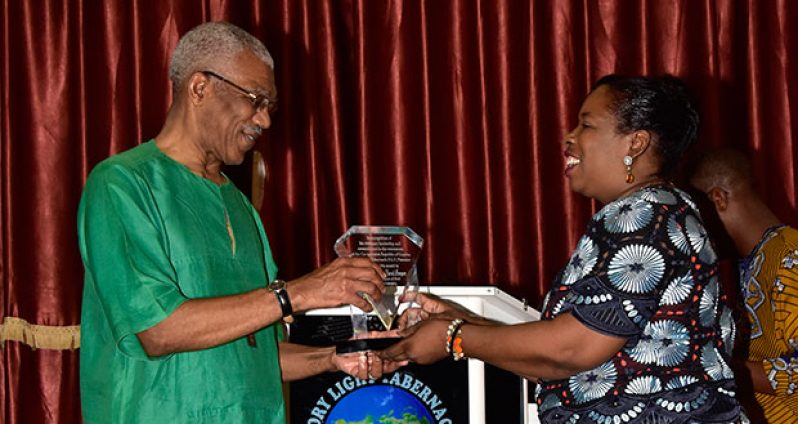— President calls for preservation of four pillars for stronger society
By Ravin Singh
THE plantations which greeted African slaves when they were brought to British Guiana more than 200 years ago were transformed into a nation which now boasts a rich multi-ethnic composition, much to the credit of freed Africans.One hundred and seventy-eight years later in one of the first villages bought by freed Africans – Plaisance – President David Granger stood before a congregation where he reflected on the

contributions of Africans and the significance of Emancipation in Guyana.
Rain did little to dissuade the hundreds that gathered for the early-morning start of the Glory Light Tabernacle annual Emancipation Day Prayer and Breakfast.
The President arrived promptly at the church for the 07:30hrs start, soberly dressed in his plain green Dashiki which draped his neatly-pressed Khaki pants.
His outfit was complemented with a chocolate brown pair of shoes.
Underscoring the significance of Emancipation Day before residents of a community which was bought by 65 African slaves after they were freed, the President said that this was a day that marked the “deliverance from bondage” of over 200 years of enslavement.
He contended that this day is synonymous with determination, as African fore-parents were determined to build better lives for themselves and generations to come.
“Today is a day of departure; a departure from degradation, a departure from discrimination and a departure from domination” he said, injecting the biblical reference of Psalm 118:24 which states, “This is the day that the Lord has made, and we will give thanks and be glad.”
The Head-of-State, who is also a historian, noted that this day represents Guyana’s first national day, since it paved way for the immigration of Indentured labourers to Guyana. He explained that Emancipation is acknowledged and celebrated by all ethnic groups in Guyana because it represented the building of a platform for a free nation.
But gaining Emancipation was not the only goal of these “determined people” the President said, adding that after Emancipation, Africans embarked on a series of movements to transform the plantations for human habitation.
These movements, the President said, includes a labour movement, a Village Movement, a political movement and a cultural movement. In addition, he underscored the need to pay homage to the churches since these were the institutions that stood by the Africans during the “dark days of enslavement”.
But religious institutions did not support the Emancipation Movement in isolation. In fact, the President sought to pay tribute to those who fought for freedom, through the Berbice, Demerara and the Essequibo rebellions which all resulted to the loss of lives.
Shaped by these events, it is the Head-of-State’s belief that Guyana was taking form to become a single political, social and cultural unit.
“The Africans came and met plantations and left a nation.”
But this nation that was created, he said, was not created for Africans alone, but rather for all the people of Guyana.

And that is exactly what stands as testimony today. The President pointed to the fact that these villages which were bought by freed Africans are now multiethnic and have become integrated in nature. This integration, he contended, was because of Emancipation.
The Head-of-State also reflected on the fact that when these villages were built in colonial times, they were built on four pillars. Those, according to him, are the home, the church, the school and work.
As such, he pleaded with those in attendance to ensure that these pillars do not collapse.
“I plead with you brothers and sisters, not to shake these pillars, not to shake the pillars of this foundation. Don’t shake the home with your recklessness. Don’t shake the church with your disbelief. Don’t shake the school with your ignorance. And don’t shake the farms with your laziness,” he said.
His lengthy, but insightful and refreshing speech, which was evidently well received, was succeeded by the presentation of a token of appreciation by the Church, on behalf of Pastor Jacqueline Yorrick.
The service was punctuated with cultural presentations which aroused the spiritual and cultural sentiments and seemingly invoked a sense of pride in those whose foreparents were a part of the struggle for freedom. Following this was the traditional sharing of breakfast which is usually a highly anticipated moment where many seize the opportunity to socialise.



.jpg)









